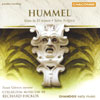Hummel Mass in D minor; Salve Regina
Hickox and Co put us in their debt by rescuing more Hummel from neglect
View record and artist detailsRecord and Artist Details
Composer or Director: Johann Nepomuk Hummel
Genre:
Vocal
Label: Chandos
Magazine Review Date: 1/2006
Media Format: CD or Download
Media Runtime: 57
Mastering:
Stereo
DDD
Catalogue Number: CHAN0724

Tracks:
| Composition | Artist Credit |
|---|---|
| Mass |
Johann Nepomuk Hummel, Composer
Collegium Musicum 90 Collegium Musicum 90 Chorus Johann Nepomuk Hummel, Composer Mark Padmore, Tenor Pamela Helen Stephen, Mezzo soprano Rachel Nicholls, Soprano Richard Hickox, Conductor Stephen Varcoe, Baritone |
| Salve regina |
Johann Nepomuk Hummel, Composer
Collegium Musicum 90 Collegium Musicum 90 Chorus Johann Nepomuk Hummel, Composer Richard Hickox, Conductor Susan Gritton, Soprano |
Author: Edward Greenfield
Richard Hickox and Collegium 90 continue their excellent Hummel series with two more choral works far too long neglected. The D minor Mass of 1805 was the second of five that Hummel wrote for Prince Esterházy, carrying on from Haydn’s late masterpieces. D minor was the key chosen by Haydn for his Nelson Mass seven years earlier but Hummel’s opening could hardly be more different. If its persistent syncopations on repeated notes at the start suggest a curious hesitancy, one can look to Mozart’s Piano Concerto No 20 as a direct inspiration; this Kyrie develops from hesitancy into blazing confidence.
Throughout, Hummel seems intent on taking the listener by surprise: the Gloria emerges in a positive D major on a bold unison motif using the notes of the common chord but develops quickly into elaborate counterpoint; the Credo starts lyrically, the opposite of a positive affirmation of belief, though that is developed as the movement progresses. Hummel intended to write a thoughtful rather than a sharply dramatic setting, with the soloists generally treated as a corporate team set against the full choir: the tenor solo for ‘Et incarnatus est’, sung with honeyed tone by Mark Padmore, is a striking exception. The brief Sanctus is positive with military overtones; the Benedictus in triple time starts with the soloists alone; while the Agnus Dei finally returns us to D minor before the triumphant setting of ‘Dona nobis pacem’.
The Salve regina of 1809, the year Haydn died, may have been written for a memorial event to Hummel’s great predecessor, but it is anything but elegiac in its operatic style with elaborate coloratura for the soprano soloist, here glowingly sung by Susan Gritton. Richard Hickox again proves an ideal interpreter, drawing superb playing and singing.
Throughout, Hummel seems intent on taking the listener by surprise: the Gloria emerges in a positive D major on a bold unison motif using the notes of the common chord but develops quickly into elaborate counterpoint; the Credo starts lyrically, the opposite of a positive affirmation of belief, though that is developed as the movement progresses. Hummel intended to write a thoughtful rather than a sharply dramatic setting, with the soloists generally treated as a corporate team set against the full choir: the tenor solo for ‘Et incarnatus est’, sung with honeyed tone by Mark Padmore, is a striking exception. The brief Sanctus is positive with military overtones; the Benedictus in triple time starts with the soloists alone; while the Agnus Dei finally returns us to D minor before the triumphant setting of ‘Dona nobis pacem’.
The Salve regina of 1809, the year Haydn died, may have been written for a memorial event to Hummel’s great predecessor, but it is anything but elegiac in its operatic style with elaborate coloratura for the soprano soloist, here glowingly sung by Susan Gritton. Richard Hickox again proves an ideal interpreter, drawing superb playing and singing.
Discover the world's largest classical music catalogue with Presto Music.

Gramophone Digital Club
- Digital Edition
- Digital Archive
- Reviews Database
- Full website access
From £8.75 / month
Subscribe
Gramophone Full Club
- Print Edition
- Digital Edition
- Digital Archive
- Reviews Database
- Full website access
From £11.00 / month
Subscribe
If you are a library, university or other organisation that would be interested in an institutional subscription to Gramophone please click here for further information.




